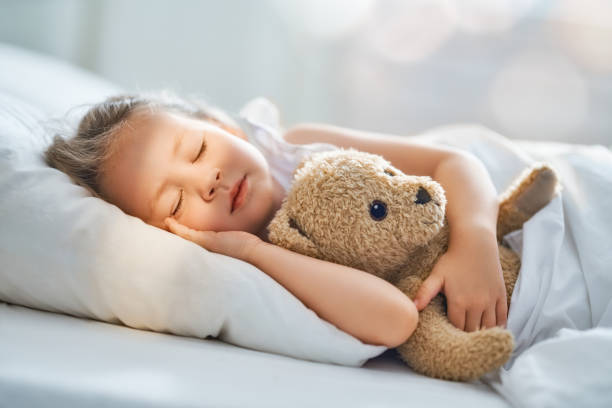Your kid doesn’t want to go to sleep. But they really need to go to sleep. What now?
Listen, we’ve all been there. Getting a child down for the night can be a hectic time, and sometimes you just daydream about how easy it’d be for your kid to be sleepy and ready to hit the hay when they’re supposed to.
It’s times like these that create good ideas that turn into even better questions, such as: maybe I should slip my kid a little melatonin. Oh crap, is melatonin even safe for kids? I should Google it.
And so here we are. So, is melatonin safe for kids? Let’s find out.
Melatonin: A Quick Intro
Melatonin is a hormone produced naturally by the pineal gland in the brain, responsible for regulating the sleep-wake cycle. While it has gained popularity as a sleep aid for adults, concerns persist regarding its safety when used in children.
Quality sleep is of extreme importance in children's development. Adequate sleep supports their physical growth, cognitive functioning, and emotional well-being. You know what they say, a well-slept kid turns into a well-adjusted adult. Ok fine, maybe they don't say that. But someone should!
However, many children experience sleep disturbances, leading parents and caregivers to seek solutions.
While melatonin may be considered as a short-term strategy for addressing sleep problems, it is crucial to recognize that its long-term effects and potential side effects in children remain poorly understood. Some studies suggest positive outcomes for select groups of children, such as those with ADHD or autism spectrum disorders, but caution is necessary.
Melatonin use in children is somewhat understudied, so let us equip you, parents and caregivers, with a well-rounded understanding of melatonin's safety and efficacy in children, as far as we (and science) know.
What is Melatonin?
Melatonin is a naturally occurring hormone in the human body that plays a pivotal role in regulating the sleep-wake cycle. Produced by the pineal gland in the brain, melatonin secretion typically begins in the evening, as natural light diminishes, signaling the body that it's time to prepare for sleep.
This hormone helps individuals fall asleep and maintain a stable sleep pattern throughout the night. It is, therefore, often referred to as the "sleep hormone."
Melatonin & Age
In children, melatonin production follows a similar pattern to adults, albeit at lower levels. As children grow, their pineal gland matures, and melatonin production increases.
However, the natural melatonin concentrations in infants and toddlers are notably low, making its use in this age group a subject of caution.
For children under 5 years old, melatonin is generally not recommended due to their developing circadian systems and the absence of long-term studies on melatonin use in this age group.
When considering melatonin supplementation for children, it is essential to exercise caution. While melatonin may be a short-term strategy for helping children achieve better sleep, its use in kids remains off-label, as the U.S. Food and Drug Administration (FDA) has not approved it for sleep disorders in this age group.
Parents and caregivers should consult with pediatricians to determine the appropriate dosage and timing for their child, taking into account age and the specific sleep issue at hand.
Additionally, it's important to be aware of potential side effects and risks associated with melatonin use in children, such as bedwetting, drowsiness, and the need for careful storage to prevent accidental ingestion.
The bottom line is, while the occasional kid-friendly dose of melatonin might help your 10-year-old fall asleep faster, you should probably keep any supplements or gummies containing melatonin away from your toddlers.

Why Consider Melatonin for Kids?
Children often experience sleep-related challenges that can disrupt their sleep patterns, affecting their overall well-being. Common sleep issues in children include difficulties falling asleep, night waking, and insufficient sleep duration.
These problems can result from various factors such as changes in routine, teething, separation anxiety, or underlying conditions like attention-deficit/hyperactivity disorder (ADHD) or autism spectrum disorders (ASD).
Melatonin supplements have gained attention as a potential solution for children with sleep problems. While melatonin is naturally produced in the body to regulate sleep-wake cycles, some children may benefit from supplementation.
Research suggests that melatonin can help initiate sleep, especially in cases where children struggle with sleep onset insomnia. It has shown promise in specific groups, such as those with ADHD or ASD, by improving sleep quality and quantity.
Recent trends in pediatric sleep aid have seen the emergence of melatonin-infused edibles gummies, which are marketed as a palatable and convenient way to administer melatonin to children.
These gummies are formulated to provide a controlled dosage of melatonin, making it easier for parents to manage their child's intake. However, it's crucial to weigh the potential benefits of such products against safety concerns, as the use of melatonin in children, including gummies, is not closely regulated.
Parents and caregivers should exercise caution, consult with healthcare professionals, and be aware of possible side effects and accidental overdose risks associated with these products.
Safety Concerns
Melatonin can be safe for children but comes with potential risks. Common side effects include bedwetting, drowsiness, headaches, and agitation.
Parents should monitor their child's response and store melatonin safely to prevent accidental ingestion, which can lead to more severe symptoms. Determining the appropriate dosage, typically starting at 1 milligram and following a healthcare provider's guidance, is crucial for safe use.
Melatonin is generally not recommended for children under 5 due to low natural melatonin levels and incomplete circadian system development.
Limited research raises concerns about its impact on infants and toddlers. The decision to use melatonin should be based on age-specific considerations and consultation with a pediatrician.
Safe melatonin use in children requires precise dosage determination based on age, sleep issue, and individual needs, with a preference for lower initial doses. Proper timing, typically 30 minutes to an hour before bedtime, aligns with the body's natural melatonin production.
Melatonin should not serve as a long-term solution, and exploring alternative strategies to improve sleep hygiene and address underlying issues is essential for children's safety and well-being.
The most important thing to remember when it comes to melatonin and children is always keeping in mind that they’re children. If you choose to experiment with melatonin for your child, do so cautiously and dose accordingly. Monitor the way your child reacts to it, and remember melatonin is not meant to be a long-term solution for sleeplessness in children.

Factors to Consider
Consulting with a healthcare provider is a critical step when considering melatonin for children. While melatonin can be a helpful tool for addressing sleep issues, its use in children should be guided by a healthcare professional.
A pediatrician can evaluate the child's specific sleep problem, age, and overall health to determine if melatonin is a suitable option. They can also provide expert advice on the appropriate dosage and timing to ensure safety and effectiveness.
By seeking professional guidance, parents and caregivers can make informed decisions regarding melatonin use for their children's sleep concerns.
Other Alternatives
Before turning to melatonin, parents and caregivers should explore alternative sleep management strategies. Identifying and addressing the underlying causes of sleep disturbances is essential. This includes factors like changes in routine, teething, separation anxiety, or medical conditions.
Behavioral modifications and consistent bedtime routines can often resolve sleep difficulties in children. Additionally, limiting electronic device use before bedtime to reduce exposure to blue light and implementing calming activities can contribute to better sleep quality.
By prioritizing these alternative strategies, parents can minimize the need for sleep aids like melatonin.
Sleep Hygiene
Promoting good sleep hygiene is fundamental to ensuring children get the restorative sleep they need. Establishing a consistent bedtime routine that includes soothing activities like reading or singing lullabies can create a conducive environment for sleep.
Parents should also consider the timing of activities like bathing to avoid overstimulation before bedtime. Moreover, limiting the use of electronic devices, such as phones and tablets, in the hours leading up to bedtime helps prevent disruptions to natural melatonin release, promoting healthier sleep patterns.
By focusing on these fundamental aspects of sleep hygiene, parents can improve their child's sleep without the need for supplemental aids like melatonin.
Recent Research and Studies
Recent research highlights melatonin's safety for short-term use in children but raises questions about its long-term effects and potential risks. Side effects like bedwetting, drowsiness, headaches, and agitation have been observed in some children using melatonin supplements.
Limited FDA regulation of melatonin products adds concerns about quality control. Parents and caregivers must exercise caution, seeking healthcare provider guidance for safe use.
Expert opinions vary regarding melatonin use in children. Some advocate its potential benefits, especially for children with conditions like ADHD or ASD experiencing sleep disturbances. These experts suggest melatonin may improve sleep quality and duration in such cases.
However, close monitoring for adverse effects and professional supervision are emphasized. Melatonin use should be guided by healthcare providers who can offer personalized advice.
Additional research is required to address long-term effects, optimal dosages for different age groups, and melatonin's impact on hormonal development in adolescents.
Establishing expert consensus is crucial to create guidelines for safe and effective melatonin use in children. Until then, parents and caregivers should continue consulting healthcare providers to make informed decisions about melatonin use for their children's sleep problems.

Navigating Melatonin Use for Children's Sleep
So, is melatonin safe for kids?
Although melatonin can be a valuable tool for improving children's sleep, its use should always be approached with caution, professional guidance, and a focus on holistic sleep management strategies.
Prioritizing good sleep hygiene and addressing underlying causes remain essential in ensuring children get the quality rest they need for healthy development and well-being.
Remember, children are just very tiny humans, so if you do choose to give your child melatonin, be sure to find accurate dosages proportionate to their age and size.
Melatonin supplements for children should not be regarded as a long-term solution, but as long as your child is old enough, a little melatonin once in a blue moon won’t hurt!









